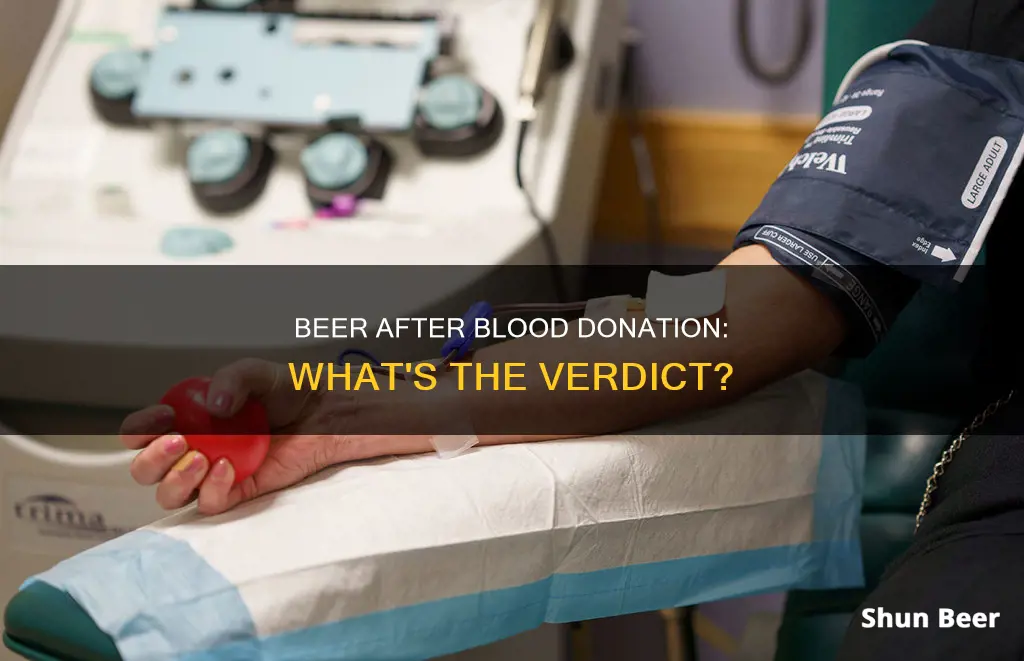
Donating blood is a generous act that can save lives, but it's important to take care of yourself afterward. So, is it okay to drink beer after donating blood? The short answer is no. It is recommended that donors refrain from consuming alcohol for at least 24 hours after giving blood. This is because donating blood can lead to dehydration, and alcohol can exacerbate this issue due to its diuretic effect. Dehydration can cause lightheadedness, fainting, and dizziness, which are already potential side effects of donating blood. Additionally, alcohol may affect blood coagulation, increasing the risk of bleeding and reducing blood pressure. It's also worth noting that even a small amount of alcohol may lead to increased intoxication due to lower blood volume after donation. Therefore, it's best to avoid alcohol and focus on rehydrating and replenishing fluids after donating blood.
| Characteristics | Values |
|---|---|
| Drinking beer after donating blood | Not recommended |
| Reason | Dehydration, increased risk of bleeding, reduced blood pressure, impaired cognitive and motor skills, negative interactions with medication |
| Safe time to consume alcohol after donating blood | 24 hours |
What You'll Learn
- Drinking beer after donating blood can lead to dehydration
- It is advised to wait at least 24 hours after donating blood before drinking alcohol
- Blood sugar can drop after donating blood, and alcohol can increase the risk of low blood sugar
- Alcohol can negatively impact your body's ability to process alcohol, leading to increased intoxication
- Drinking alcohol after donating blood can affect blood coagulation and increase the risk of bleeding

Drinking beer after donating blood can lead to dehydration
After donating blood, it is important to restore the fluid lost during the process. Alcohol, however, being a diuretic, will only increase fluid loss. This can lead to dehydration, which can cause further unpleasant symptoms. Dehydration can be dangerous, and it is important to be aware of the risks, especially after donating blood.
The diuretic effect of alcohol can cause an increase in urine production, which can lead to dehydration. When you donate blood, your body loses a significant amount of fluid, and replacing this fluid is crucial for your recovery. Drinking alcohol instead of water or other hydrating fluids can slow down your recovery and put you at risk of dehydration.
Additionally, after donating blood, your body has less blood to dilute the alcohol in your system. This means that your blood alcohol concentration will rise faster, and the effects of alcohol will be more pronounced. This can further increase the risk of dehydration, as alcohol can impair your judgment and make it harder to recognize the signs of dehydration.
To avoid dehydration and its associated risks, it is recommended to abstain from consuming alcoholic beverages for at least 24 hours after donating blood. During this time, focus on rehydrating your body and restoring the fluid lost during the donation process. Drinking plenty of water and other hydrating fluids will help speed up your recovery and ensure your body has the resources it needs to replenish the donated blood.
Beer and Heartburn: Tums to the Rescue?
You may want to see also

It is advised to wait at least 24 hours after donating blood before drinking alcohol
Drinking alcohol after donating blood is not recommended due to the risk of dehydration, which can lead to dizziness and fainting. Alcohol has a diuretic effect, which can worsen dehydration, especially since donating blood already increases this risk. Additionally, consuming alcohol may negatively affect blood coagulation, increasing the risk of bleeding and reducing blood pressure.
It is generally advised to wait at least 24 hours after donating blood before drinking alcohol. This waiting period allows the body to recover and replenish lost fluids and electrolytes. It also helps prevent anemia and gives the body time to replace blood plasma volume. The recovery timeframe may vary between individuals, so it is important to listen to your body and extend the waiting period if needed.
During the 24-hour period after donating blood, it is crucial to focus on rehydration. Drinking plenty of water, fruit juice, and sports drinks can help maintain the body's water balance and support the recovery process. It is also recommended to eat nutritious meals and include foods rich in iron, such as red meat, spinach, and beans, to aid in red blood cell regeneration.
While it might be tempting to relax with an alcoholic beverage after donating blood, it is essential to prioritize your health and well-being. Abstaining from alcohol for at least 24 hours will ensure a smoother recovery and reduce the risk of negative side effects.
If you do choose to consume alcohol after the 24-hour waiting period, it is important to continue staying hydrated and limiting your intake. Listening to your body and being mindful of any unusual reactions or side effects is crucial.
Beer and Zoloft: Is It Safe to Drink Alcohol?
You may want to see also

Blood sugar can drop after donating blood, and alcohol can increase the risk of low blood sugar
Donating blood is a generous act that can save lives. However, it is important to take care of yourself after donating, as your body will be working to replace the donated blood and recover from the experience. One question that often arises is whether it is safe to consume alcohol after donating blood. The answer is that it is generally recommended to abstain from alcohol for at least 24 hours after donating blood. This is because drinking alcohol can have harmful consequences and increase the risk of low blood sugar.
Blood Sugar and Alcohol:
When you donate blood, your body loses fluids, and your blood volume decreases. This reduced blood volume can make it easier for your blood sugar levels to drop, and alcohol consumption can further contribute to this risk. Alcohol can affect your body's ability to process glucose, leading to a decrease in blood sugar levels. Additionally, alcohol can also impact your body's ability to feel the symptoms of low blood sugar, making it harder to recognize and address the issue.
Dehydration and Alcohol:
In addition to the risk of low blood sugar, alcohol consumption after donating blood can also lead to dehydration. Alcohol is a diuretic, which means it increases the amount of water lost through urination. This can exacerbate the fluid loss that occurs during blood donation. Dehydration can cause lightheadedness, dizziness, and fainting, which are already potential side effects of blood donation.
Impaired Decision-Making:
Drinking alcohol after donating blood can also impair your decision-making abilities and coordination. You may feel weak or lightheaded after donating blood, and consuming alcohol can enhance these effects. This can make it difficult to make safe choices, react quickly, or engage in activities such as driving or operating heavy machinery.
Medication Interactions:
Alcohol consumption after donating blood may also have negative interactions with any medications you are taking. It is important to consider the potential risks and always consult your doctor or pharmacist if you have any concerns.
Recovery Tips:
To ensure a speedy recovery after donating blood, it is crucial to stay hydrated by drinking plenty of water, fruit juice, or sports drinks. Getting enough rest and avoiding strenuous physical activity is also important. Eating iron-rich foods, such as red meat, spinach, and beans, can aid in regenerating red blood cells. It is generally recommended to wait at least 24 hours after donating blood before consuming alcohol. However, it is important to listen to your body and extend this timeframe if needed, as recovery times can vary.
Beer and Gleevec: A Safe Mix?
You may want to see also

Alcohol can negatively impact your body's ability to process alcohol, leading to increased intoxication
Drinking alcohol after donating blood can have harmful consequences on the body. Alcohol negatively impacts your body's ability to process alcohol, leading to increased intoxication. This means that even a small amount of alcohol can make you feel more intoxicated than usual.
When you donate blood, your body loses fluids, and alcohol has a diuretic effect, which can make you dehydrated. Dehydration can lead to lightheadedness, dizziness, fainting, and dark urine. Donating blood also increases the risk of dehydration, which, when combined with alcohol, can be dangerous.
Additionally, drinking alcohol after donating blood can affect blood coagulation, increasing the risk of bleeding and reducing blood pressure. It can also impair your cognitive and motor skills, making it unsafe to drive or operate heavy machinery.
To ensure a speedy recovery and avoid these risks, it is recommended to abstain from consuming alcoholic beverages for at least 24 hours after donating blood. During this time, focus on rehydrating and restoring your body's fluid balance by drinking plenty of water, fruit juice, or sports drinks.
Cricketers and Beer: A Common Combination?
You may want to see also

Drinking alcohol after donating blood can affect blood coagulation and increase the risk of bleeding
Drinking alcohol after donating blood can have harmful consequences on the body. It is recommended that you abstain from alcohol for at least 24 hours after donating blood. This is because alcohol can affect blood coagulation and increase the risk of bleeding.
When you donate blood, your body loses fluids, and alcohol has a diuretic effect, which can lead to dehydration. Dehydration can cause lightheadedness, fainting, and dizziness. These symptoms can be dangerous, especially if you have donated blood and are already feeling weak or lightheaded.
Additionally, alcohol can affect your body's ability to process it. You may find that even a small amount of alcohol can make you feel more intoxicated than usual. This is because there is less blood to dilute the alcohol in your system. As a result, your blood alcohol concentration will rise faster, and the effects of alcohol will be exacerbated.
Drinking alcohol after donating blood can also negatively impact your cognitive and motor skills. It can make it harder to make safe choices or react quickly in certain situations, such as driving or operating heavy machinery. It is crucial to take good care of your body after donating blood to ensure a rapid recovery and maintain your overall health.
Furthermore, alcohol consumption after donating blood can have negative interactions with any medications you may be taking. It is important to consider the possible side effects and risks associated with mixing alcohol and medication.
To speed up your recovery after donating blood, it is essential to stay hydrated by drinking plenty of fluids, including water, fruit juice, and sports drinks. Getting enough rest and consuming nutritious foods, especially those rich in iron, can also aid in your body's regeneration of red blood cells.
Beer Overload: Yeast Infection Culprit?
You may want to see also
Frequently asked questions
It is not recommended to drink beer or any other form of alcohol after donating blood. Alcohol can cause dehydration, which can lead to dizziness and fainting. It may also affect blood coagulation and increase the risk of bleeding. It is best to wait at least 24 hours before consuming alcohol.
Drinking alcohol after donating blood can have harmful consequences on the body. It can cause dehydration, affect blood coagulation, and increase the risk of bleeding. Alcohol can also impair your cognitive and motor skills, making it unsafe to drive or operate heavy machinery.
It is generally recommended to wait at least 24 hours after donating blood before consuming alcohol. This allows your body to recover and replenish lost fluids and electrolytes. However, everyone's physical makeup is different, so recovery timeframes may vary.







